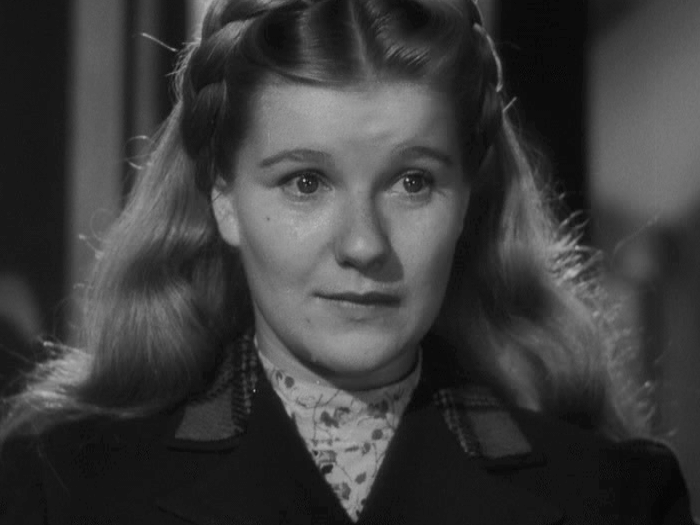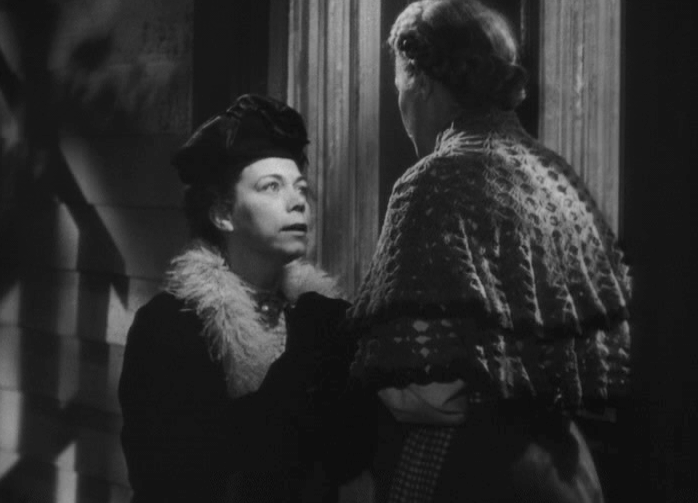Presenting the Supporting Actresses of '48. A young writer, a drunken chanteuse, two spinster aunties, and a girl who never gets to the nunnery.
THE NOMINEES
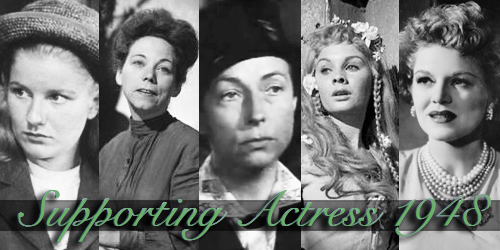
1948 is so basic. A typical Best Supporting Actress shortlist looks almost exactly like this: an actress whose paid her dues finally getting a plum opportunity (hello usually uncredited Ellen Corby in I Remember Mama finally stepping into the limelight), a rapidly rising star (Jean Simmons in Hamlet, not her first attention grabbing role in the late 40s), a fresh ingenue in a popular picture (Meet Barbara Bel Geddes in I Remember Mama), and if you're lucky in a good year a couple of revered character actresses to class up the shortlist joint (Agnes Moorehead in Johnny Belinda and Claire Trevor in Key Largo). And within that mix you'll usually have a protagonist demoted to "supporting" and Best Picture heat helping at least a few of them find a seat at the table. All of that is true for 1948. What isn't so typical is a supporting actress winning on a picture's sole nomination and that happened here. Key Largo has aged well but Oscar didn't have any time for it back then outside of Trevor's drunk despair. The other three pictures had 24 nominations between them!
Here to talk about these five turns are screenwriter/author Abdi Nazemian ("The Walk in Closet"), film blogger Catherine Stebbins (Cinema Enthusiast), freelance journalist Joe Reid, film critic Tim Robey (The Telegraph), and your host Nathaniel R (The Film Experience). In addition to this write up we recorded a companion podcast where we flesh out some of these thoughts and expound on the movies themselves.
Without further ado...
1948
SUPPORTING ACTRESS SMACKDOWN
BARBARA BEL GEDDES as "Katrin" in I Remember Mama
Synopsis: A teenager who dreams of being a writer finds source material in her immigrant mother
Stats: Then 26 yrs old, 2nd film, first and only nomination. 72 minutes of screen time (or 54% of running time).
Abdi Nazemian: She carries much of the emotional life of the film, but I found the film unbearably sentimental (this from a man who loves Andy Hardy movies and Little Women). She lacks the unique quirks that young actors like Judy Garland and Mickey Rooney brought to the same kinds of roles, and gives us a bland portrayal of adolescence. Of all the nominated actresses, she was given the most screen time, and did the least with it. ♥
Catherine Stebbins: One of these days I’ll figure out why I’m always so drawn to Bel Geddes. She has a lot of screen time as Katrin, given the unenviable task of holding up the film’s relentless episodic nostalgia. She is narrator, observer, worshiper, and an adult playing an adolescent. Katrin constantly looks at her mother, whether in the background or foreground, with reverent awe. Bel Geddes plays this with a partial cognizance that Katrin is in the gently reenacted memories of her past. ♥♥♥
Joe Reid: I can see how, if you were swept up in the homey charms of George Stevens' film, you'd want to throw accolades at Bel Geddes, who plays such an observant window onto the life of her saintly mother. Her hushed voice-over gets to the gauzy-memoir nature of the story effectively, but I'm not sure the performance ever gets much farther than doe-eyed wonderment. ♥♥
Tim Robey: Saddled with just about the hoariest framing narration in film history, and doing little to lift it out of sanctified goo, Barbara has a near-impossible task here – making the terminally precious Katrin and her “gifted” (read: soporific) memoirs interesting. She can’t win, but we still need something more than a voice like tree sap to get us through this. In overegged close-ups she’s weirdly divorced from real-time engagement with her scenes, and every co-star seems faintly embarrassed about what to do with her. ♥
Nathaniel R: In the movie's crowded frames, you can often see just her hair or the back of her head; unfortunately her full closeups aren't that much more expressive, generally landing a single emotion. The narration is even stiffer like she's reading to a very small child from an immobile body cast. (The direction and screenplay all but force this stiff repetitiveness though, so it's not all on her) She aces warm awestruck looks at goddess Irene Dunne, but... I mean... who doesn't? ♥
Reader Write-Ins: "She is telling THEIR story, which she happens to be in. Therefore she is bland, quiet, blending to the background so others can showcase themselves." - Tom (Reader average: ♥♥¼)
Actress earns 10¼ ❤s
four more actresses after the jump
ELLEN CORBY as "Aunt Trina" in I Remember Mama
Synopsis: A spinster aunt to a Norwegian family has surprising news - a marriage proposal. The family makes a fuss briefly and moves on... they've got their own drama, okay?
Stats: Then 37 yrs old, 2nd credited film role (but numerous bit parts before hand, first and only nomination. 29 minutes of screen time (or 22% of running time)
Abdi Nazemian: Plus: I’m obsessed with her face. Her expressive eyes always have a gleam in them, hinting at a rich emotional life within. Minus: The accent wears thin. Plus: She brings a dose of sly humor to balance out the film’s saccharine elements. Minus: She isn’t given any truly great scenes. Plus: Take a look at Oscar Homolka as Uncle Chris to see how much she could have overplayed the role. ♥♥♥
Catherine Stebbins: Grandma Walton does as much as can reasonably be expected with Aunt Trina. To her credit, Corby’s neurotic wispiness feels a bit more lived in and less overt than most of the film’s other performances. But she is given the most tiresome material in an endless sea of tiresome material (bills, cats, hospitals, dresser sets; the list goes on). While competent, she can’t elevate her quest for marriage with Mr. Thorkelson. Hell, even the other characters can't be bothered with her. ♥♥
Joe Reid: If the mark of an effective supporting performance is that you'd happily watch a movie with their character as the lead, Corby certainly succeeds. As much as I admired Irene Dunne's central performance, I kept longing for a movie that didn't revere its main character so much. It does not revere Aunt Trina. She's flighty and nervous and kind of pathetic in relation to her pillar of a sister, but Corby plays her with a sweetness that never begs for sympathy. ♥♥♥♥
Tim Robey: Actressing quite literally at the edges in most shots, and mustering a birdlike persistence that pecks away at you, Corby makes good, darting impressions whenever she appears. Thanks to her, Aunt Trina is the rare character in I Remember Mama you want to spend more time with, not less. She gets a lovely last full-frame shot – almost her only one, unlike the barrage for Babs – and makes the most of this. But it feels like a consolation prize for very sporadic opportunities. ♥♥♥
Nathaniel R: Corby captures the plight of the nervous introvert in a loud family well. But despite sympathetic physical work, the movie doesn't know how to harness her but for comic asides. She's reduced to a mere foil to accentuate goodheartedness, bulldozing, and pettiness in others. But you do feel warmly for her by the end and that counts for a lot within the nostalgic memoir genre. ♥♥♥
Reader Write-Ins: "I noticed myself missing Aunt Trina when she was off the screen." -Eoin (Reader average: ♥♥½)
Actress earns 17½ ❤s
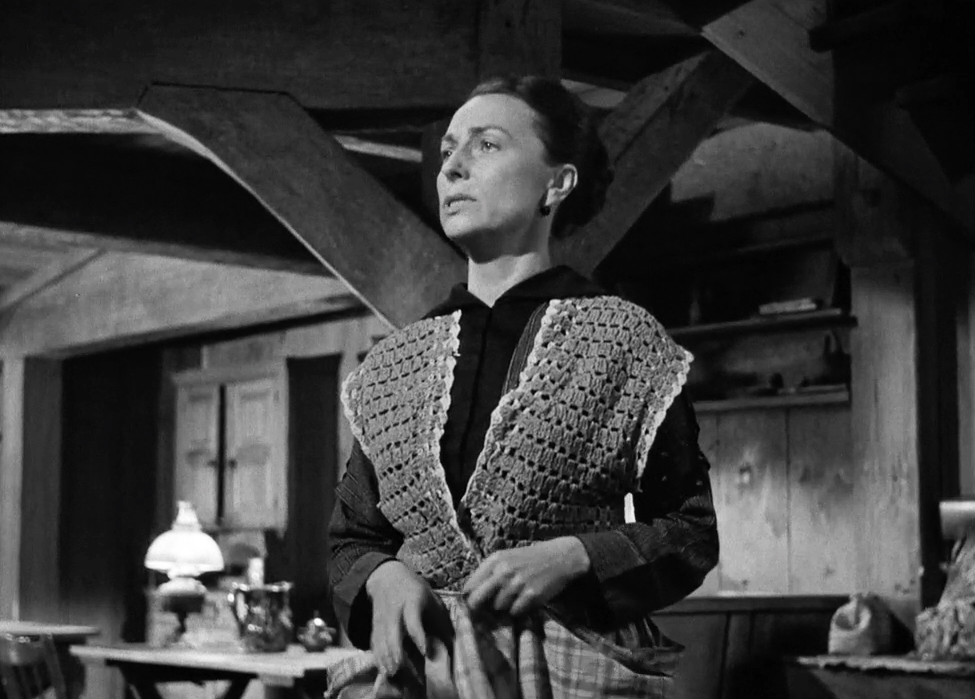
AGNES MOOREHEAD as "Aggie MacDonald" in Johnny Belinda
Synopsis: An overworked farmer's sister struggles to understand her deaf niece's troubles
Stats: Then 48 years old, 21st film, third of four nominations. 22½ minutes of screen time (or 22% of running time).
Abdi Nazemian: Like I Remember Mama, this movie has “important picture” written all over it, but the actors rise above the politics of the film with affecting performances. Moorehead brings the right mix of bitterness and empathy to her role, and her brusque manner is very effective when juxtaposed to Wyman’s vulnerable and beautifully portrayed Belinda. She’s given a big character arc and an accent to pull off, and she does both admirably. ♥♥♥♥
Catherine Stebbins: The spinster aunt who shifts from untargeted callousness to fretful protector. The scene telegraphing this is Moorehead’s best, as she conveys immediate empathy and crushing sorrow. Otherwise, this is accent-led, largely surface-level work; a decent portrayal of an archetype (though she does have fun lurking around the frame a la ‘Hush, Hush’). It doesn’t help that Aggie’s relationship with Belinda is spoken of but never really shown. I personally preferred the yearning and ethically conflicted Jan Sterling as a potential nominee. ♥♥
Joe Reid: Just once in my life, I'd like to be able to travel back in time and have Agnes Moorehead yell at me. Just haul off and upbraid me in whatever cockamamie accent she prefers. While I'm inclined to believe that Jane Wyman won the Oscar for managing to resist tumbling right out into the Nova Scotian waters on the back of Moorehead's rolling 'R's, Aunt Aggie is still the most watchable thing on screen at all times. Astringency like hers is so welcome in a movie that seems determined to put its main character through the most predictable of paces. ♥♥♥
Tim Robey: Agnes is – surprise! – Spinster Aunt Aggie, more or less her character for life. She’s always tough as old boots, and here tramps them indomitably through the Nova Scotia mud. At first it’s all bustling and charwork, then she gets her best scene revealing, not a heart of mush under this iron hide, but the next best cliché, loving anxiety. Handwringing, alas, dominates from there on, and while there’s no one else you’d rather be doing this, the role dribbles away on her. ♥♥
Nathaniel R:She's always a welcome sight but what surprised me in this totally typecast part was Agnes unflattering take on Aggies flashes of recognition, immediately waved away in choice hand-shaking gesture or quick busy work that she's understood Belinda's not such a "dummy" all along but just didn't have the patience for her / to admit it. Aggie's about face when the girl is in trouble "I've been so cross with her" totally lands against the odds. ♥♥♥
Reader Write-Ins: "I love her sour face!" -Peggy Sue (Reader average: ♥♥♥)
Actress earns 17 ❤s
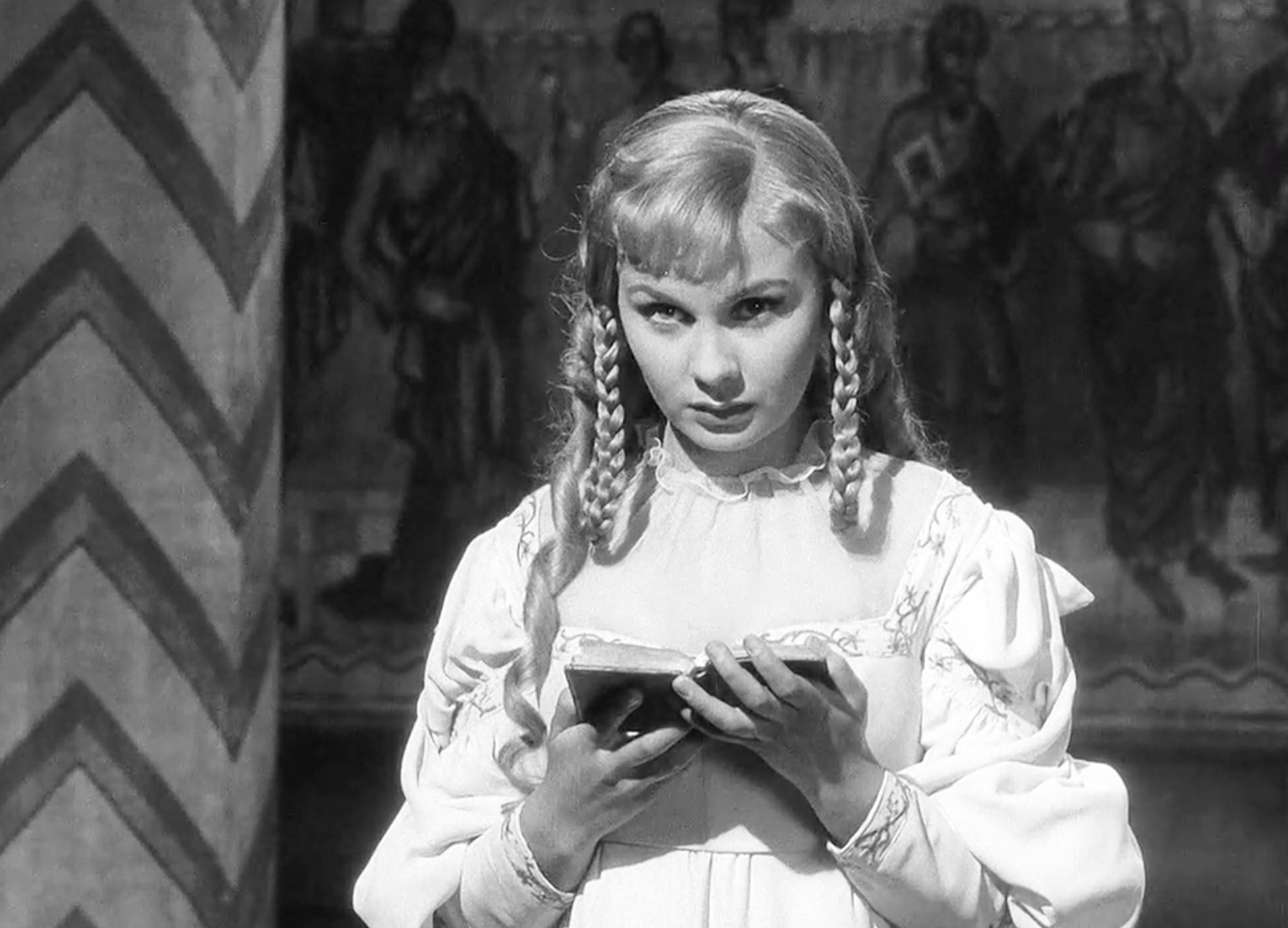
JEAN SIMMONS as "Ophelia" in Hamlet
Synopsis: A lady of the court is driven mad by the indecisive affections of a cruel Prince in the rotten state of Denmark.
Stats: Then 19 years old, 12th film, first of two nominations. 28 minutes of screen time (or 18% of the running time).
Abdi Nazemian: Olivier’s wife Vivien Leigh played Ophelia opposite her husband onstage, and I couldn’t help but wish she had brought her brilliant madness to the film. Simmons is often compelling, but I found myself spending more time thinking about her hair than her performance. Did she bleach it to emulate Hamlet? What is the Freudian symbolism behind the braided loops around each side of her face that loosen as she goes mad? Why did her agent approve those bangs? ♥♥
Catherine Stebbins: Has this doll-like Ophelia ever left the castle grounds? Despite the high rating, I’m still mulling over this performance, having grown up with Bonham-Carter’s dodgy-eyed interpretation, and being more taken with Olivier’s immortal visualization of Simmons (she drifts, floats, and sobs towards and away from the camera) than her intentional contribution. Olivier regards her little as a scene partner, but she holds her own as an unstudied ingénue among capital A Actors, admirably avoiding hysterics by depicting lunacy like an ethereal lost ghost. ♥♥♥♥
Joe Reid: There are ways to make the Ophelia character interesting in a production of Hamlet, but I'm not sure Olivier was all that concerned with that. Obviously the text gives the character a lot of attention, but the movie is content to show her in a series of prostrate poses and doe-eyed reaction shots. Simmons is utterly beautiful in that very Old Hollywood way, but I never really got beyond that with her performance. ♥
Tim Robey: Difficulty bonus here, as all agree Ophelia’s a total bitch to play. Big props for how unmannered Simmons is: she wrings a remarkable amount of spontaneity even from the flower-strewing mad scenes, and hasn’t pre-conceptualised her playing into floaty abstraction. After a pause-heavy start, she keeps getting better, paving the way for meltdown with her Act 3 collapse on the steps, then seeming to dip in and out of her right mind with a sing-song musicality. A movingly persuasive take on a poisoned-chalice role. ♥♥♥♥
Nathaniel R: Soft you now, whilst approaching this fair role... Simmons absorbs that in full floating around her scenes as something less than corporal in the first half. This makes her more physical haunted pacing in the second half, weirdly impactful. That said, the Madness is less felt than Acted. She's a great visual presence but just as Ophelia is less pawn-like in the royal machinations than collateral damage, Simmons work isn't a true match for the difficulty of Shakespeare's words and the forcefulness of Olivier's direction. ♥♥♥
Reader Write-Ins: "She clearly shows Ophelia’s warring emotions not just running across her face but in her entire body language." -jjnxn (Reader average: ♥♥♥)
Actress earns 17 ❤s
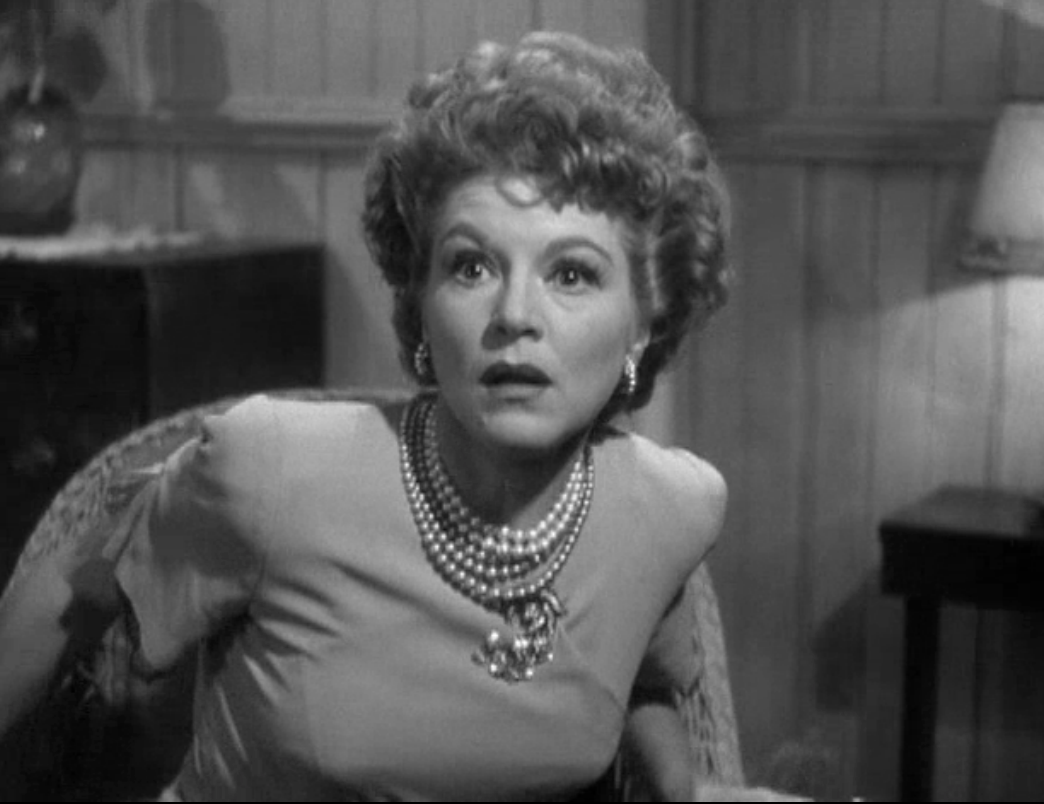
CLAIRE TREVOR as "Gaye Dawn" in Key Largo
Synopsis: An alcoholic singer travels with her gangster beau into trouble in the Florida Keys.
Stats: Then 38 yrs old, 49th film, 2nd of three nominations in this category. 28 minutes of screen time (or 28% of running time).
Abdi Nazemian: Stunning. Trevor nails every moment, elevating what could’ve been a cliché role into a brutal portrait of addiction and desperation. She connects to her fellow actors, and her neurotic melancholy is an especially perfect contrast to Bacall’s stoic confidence. As for her big scene, which involves a heartbreaking song and a descent into madness (along with Bogie enabling her alcoholism in an act of old-school altruism), let’s just say this is an Ophelia worthy of Shakespeare. ♥♥♥♥♥
Catherine Stebbins: Nestled between ‘just-one-more-drink-Johnny’, ‘thanks fella’, and lots of sidelining is the justly famous scene that single-handedly won her the Oscar. Trevor was thrown into "Moanin Low" with no warning, and it's the only time she escapes the trappings of the thankless lush. It’s a showy scene but she never plays into that impulse. It is instead Gaye’s sincere attempt to recapture something lost within her, pretending to perform in the past so she doesn’t have to face the humiliation of the present. ♥♥♥
Joe Reid: The character of the faded beauty is an easy mark for this crowd, I suspect, but Trevor brings such a life to the role that I'm not going to feel too guilty for falling for it. She basically does Ophelia better than Ophelia, if Ophelia got to perform a sad/sultry number to an unfeeling Hamlet. She's instantly a figure of pity and sympathy, but Trevor does great work to make her a presence instead of a void.. ♥♥♥♥♥
Tim Robey: Wobblier than you’d think, with as many excessive gestures as apt ones. Trevor won for a gift-wrapped stinko-moll routine that sometimes plays like a Madeline Kahn parody of itself. She’s better in her comedowns, and gets it together fine for standout moments. But it’s such a ‘featured turn’, in such a dated way, and feels like a thoroughly comfort-zone performance. She’s also strangely absent for long ensemble stretches, as if only getting out of the dressing room for inserts was worth her while. ♥♥
Nathaniel R: Gaye would be a "type" in lesser hands but Trevor is deliciously invested. Gaye’s not just a washed up drunken floozy, she's this exact drunken floozy. In a performance full of film-stealing opportunities, her pitiable outsider doesn't pull focus so much as yearn to be part of the ensemble (after securing her next drink of course). Absolute favorite bit: that staccato scream with head-turning double take - so incredibly specific. She can't believe what she's seeing and that no one is screaming with her. ♥♥♥♥
Reader Write-Ins: "Her performance as an alcoholic rivals that of Ray Milland's in The Lost Weekend for sheer realism and sympathy." -Sean (Reader average: ♥♥♥♥)
Actress earns 23 ❤s
The Oscar Went To... Claire Trevor
AND THE SMACKDOWN GIVES HER ANOTHER ROUND OF APPLAUSE
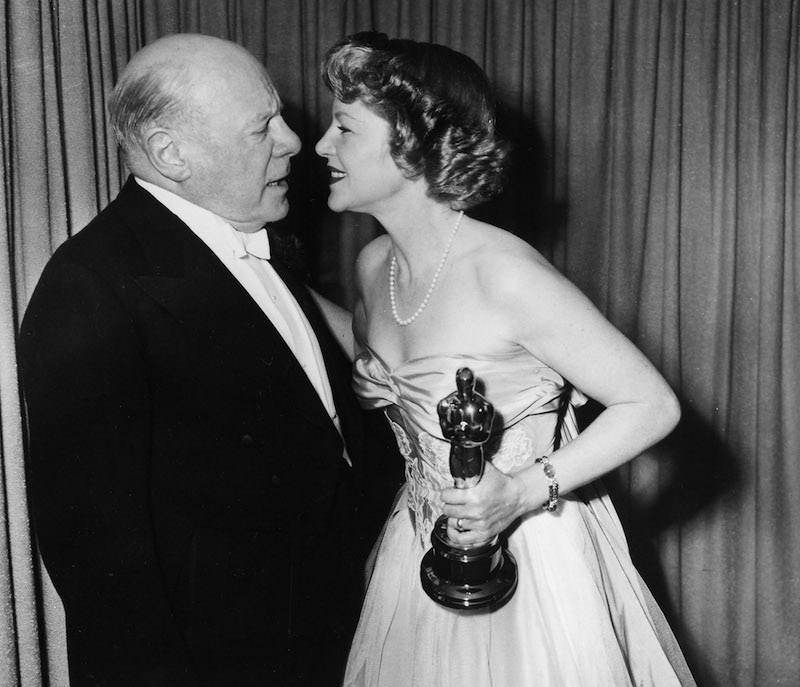 Claire Trevor receiving her Oscar from Edmund Gwenn who had won the year before for Miracle on 34th Street
Claire Trevor receiving her Oscar from Edmund Gwenn who had won the year before for Miracle on 34th Street
Would you have chosen similarly?

Want more? Listen to the companion podcast - 42 minutes of conversation about the movies of 1948, these four and others. For context we also looked back at 1948 highlight lists, discussed all five character introductions in that movies, introductions being a peculiar fascination of your host. Five more 1948 films we looked back on: The Red Shoes, Letter From an Unknown Woman,the animated shorts of the year, Treasure of the Sierra Madre and Sorry Wrong Number
Thank you for attending!
Please do share it on facebook or twitter. Previous Smackdowns ICYMI: 1941, 1952, 1964, 1968, 1973, 1979, 1980, 1989, and 2003. (Before that 30+ Smackdowns were hosted @ StinkyLulu's old site.) IN JULY WE'RE DOING 1995
